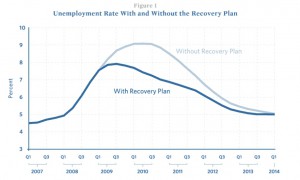This Robert Samuelson piece on the inherent problem with Keynesian economic theory – which, in my opinion, can be summed up neatly as “First, assume that your planned economy will be managed forever by an immortal, unelected, and incorruptible Keynesian economist” – is pretty good, but it has one passage in it that makes my teeth ache. Here it is, in all of its questionable glory:
For the record, I supported Obama’s stimulus – though disliking some details – and, under similar circumstances, would again. The economy was in a tailspin; the stimulus provided a psychological and spending boost. But how much is less clear. As Romer notes, estimating the effect is “incredibly hard.” For example, the Congressional Budget Office’s estimate of added jobs from the stimulus ranged from 700,000 to 3.3 million for 2010.
We’re going to unpack this, sentence by sentence. Because it has to be unpacked.
- “For the record, I supported Obama’s stimulus – though disliking some details – and, under similar circumstances, would again.” For the record, I did not. In fact, I was adamantly against calling it a ‘stimulus’ in the first place; it was in fact a demented (and nakedly partisan) Democratic wish list of pork projects and private shibboleths, and I saw no reason why I should pretend otherwise. I still don’t, in fact.
- “The economy was in a tailspin; the stimulus provided a psychological and spending boost.” First: either ‘was’ or ‘tailspin’ can be contested; September ’08 was the really scary point in the economy and we’ve been pretty much grinding metal since January 2009. Also: ‘spending’ boost I’ll grant, but ‘psychological’ was not borne out by events.
- “But how much is less clear.” Considering that I am contesting that there was a psychological boost in the first place, you may safely assume that this sentence is effectively a null statement from my point of view.
- “As Romer notes, estimating the effect is “incredibly hard.”” Actually, no: it’s fairly easy. Time for that graph from Christina Romer that Christina Romer absolutely hates: below is what they promised us, so compare it to actual results and you get a fairly decent rough guide to how well the ‘stimulus’ worked. Spoiler alert: it didn’t.
- “For example, the Congressional Budget Office’s estimate of added jobs from the stimulus ranged from 700,000 to 3.3 million for 2010.” I assume that Samuelson is referring to this November 2011 report. Rather than reinvent the wheel I’ll note Reason.com’s response to that: “[L]o and behold, if you create a model that predicts the law will create jobs, and then you rerun a mild variation of that model a few years later using updated figures about what money was actually spent, it still reports that the stimulus created jobs.” And considering that what we were promised by now was supposed to be 6% unemployment without the ‘stimulus’ and about 5.5% with it, it’s eminently fair to question the original model.
And now here’s the central problem. Back in 2009, a lot of self-identified Smart People – mostly on the Left, but the Right had its share – argued that a ‘stimulus’ was a good idea. And there were a lot of people – widely derided by those same Smart People as being stupid ignoramuses, partisan Republicans, hidebound conservatives, and just about everything else – who insisted that a ‘stimulus’ was a bad idea. And guess what? The Smart People were wrong. And the reason why goes back to my basic critique of Keynesian economic theory in the first paragraph: Keynesian economic theory is not sustainable over the long term in a truly pluralistic and democratic society. That’s because a politician given money without oversight will spend that money pretty much the same way that a drunk would, and for pretty much the same reasons.
Seriously, it was a trivial exercise in prognostication to predict that the public moneys given to the then-Democratic Congress would not end up being exclusively funneled to so-called ‘shovel-ready’ job programs. Or that our real problem – which is our long-overdue-for-pruning regulatory system – would not be affected at all by said stimulus. Or that supposed “Keynesian” politicians would blithely ignore Keynes’ own argument that governments need to be frugal when there isn’t a recession. That’s because none of these points are unique obstacles for the system to overcome. They are part of the system itself. All of which the aforementioned critics of the ‘stimulus’ did take into account, and the Smart Guys did not.
And it would be nice if the latter acknowledged it every so often.
Moe Lane (crosspost)


The Romer graph needs the actual data points plotted. You know, the unemployment figures above the “Without Recovery Plan” line.